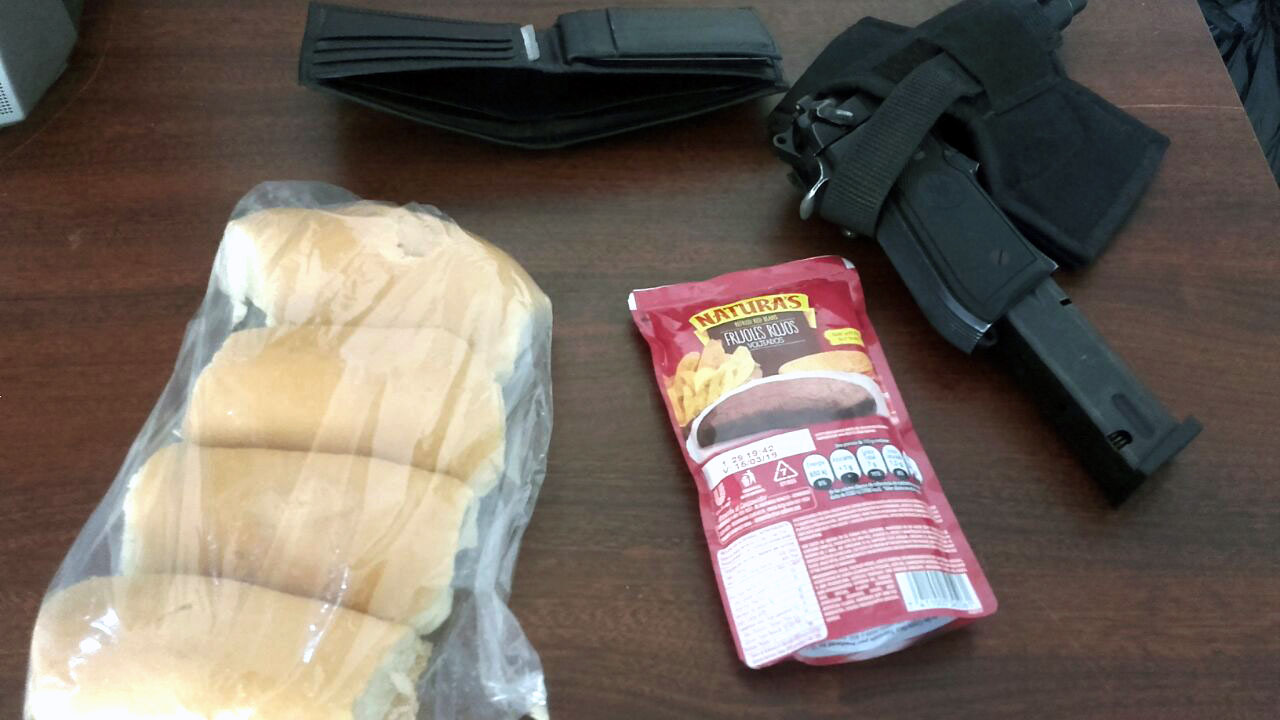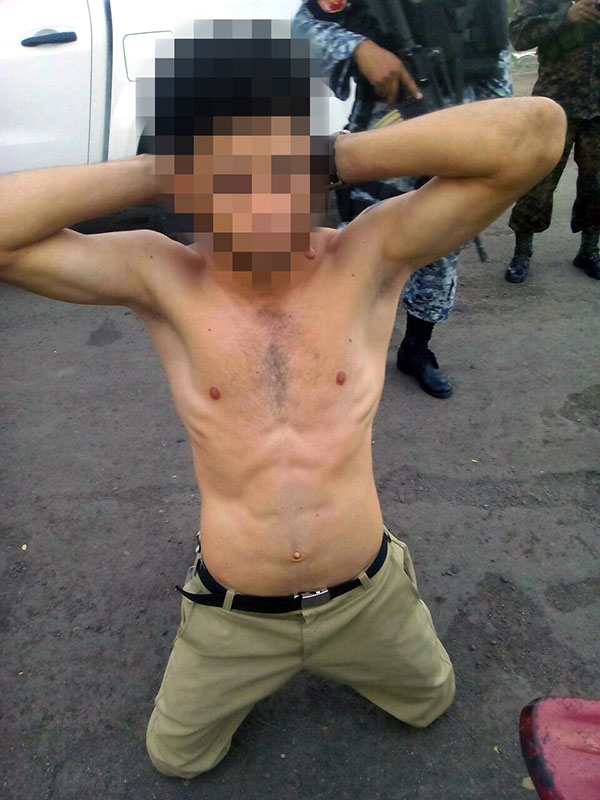US-funded police linked to illegal executions in El Salvador
San Salvador, El Salvador (CNN) -- The United States has quietly funded and equipped elite paramilitary police officers in El Salvador who are accused of illegally executing gang members, CNN has learned.
Successive US administrations have pumped tens of millions of dollars into Salvadoran law enforcement and military to shore up the government’s “Mano Dura” or Firm Hand program, first launched in 2003 but redoubled in 2014 to tackle the country’s rampant gang problem.
Yet the country’s police will be broadly accused next month of “a pattern of behavior by security personnel amounting to extrajudicial executions” in a United Nations report, seen in advance by CNN, that will also call on Salvadoran security forces to break a “cycle of impunity” in which killings are rarely punished.
One police unit that killed 43 alleged gang members in the first six months of last year received significant US funding, CNN can reveal. Several of those deaths have been investigated as murders by Salvadoran police.
While the unit -- known as the Special Reaction Forces (FES) -- was disbanded earlier this year, many of its officers have joined a new elite force that currently receives US funding.
Source: National Civil Police of El Salvador, Christopher Aragón, Creative Commons
The exact recipients and nature of US funding for Salvadoran police are shrouded in secrecy. Publicly available documents rarely specify which units benefit from the $67.9 million in total aid given in 2016, and the $72.7 million last year, but they do say that “vetted units” get mentors from the FBI and DEA.
But two sources with knowledge of the US train-and-equip program, who did not want to be identified because of the sensitivity of the matter, told CNN that the FES was the recipient of US assistance. One source detailed the kind of equipment provided, which is shown on a US report to Congress, without naming its specific recipient.
The American assistance to the FES and its successor exposes the stark moral compromises undertaken in the fight against groups like MS-13, a Salvadoran criminal gang that started in Los Angeles in the 1980s but has since spread across the Americas and has around tens of thousands of core members in El Salvador. MS-13 recruits have been described by the US government as a “transnational threat” and as “animals” by US President Donald Trump.
As FES officers were shooting gangsters dead in the streets, the US government was sending money and equipment to the group while also deporting thousands of MS-13 recruits back to El Salvador, further fueling the growth of the group in a country where police may be getting away with murder, according to the forthcoming UN report.
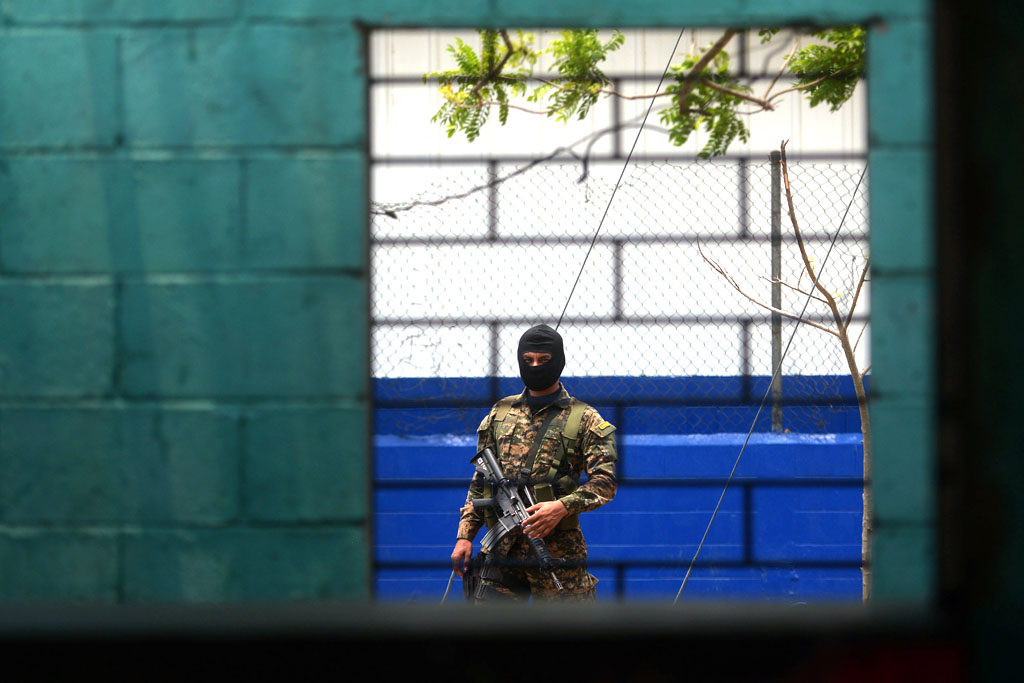
A member of the Special Reaction Forces (FES) stands guard in Soyapango, El Salvador in April 2016.
When confronted with the evidence obtained by CNN, a spokesperson for the US Embassy in El Salvador admitted for the first time that the US had supplied assistance to the FES unit, but said that “the US government takes allegations of extrajudicial killings extremely seriously, and has consistently expressed concerns regarding allegations of security force abuses, the need for accountability, and the critical role of rights-respecting security forces in a healthy democracy.”
The spokesperson added that all Salvadoran police units receiving US assistance were heavily vetted, and must show a “fundamental commitment to effective police mechanisms and respect for human rights” or the assistance stops. The US Embassy would not say if the FES received lethal aid.
The culture of lawlessness in El Salvador has also been exposed in a series of WhatsApp conversations in which officers discuss tactics for hiding extrajudicial executions and which gang members to target.
The messages, obtained by CNN, were sent in May 2017 and first leaked to local news outlet Factum by a police informant turned whistleblower who was included in the group chats. The Salvadoran police did not dispute the authenticity of the messages when asked about them by CNN.
In one exchange, an officer from an unknown police unit despairs at colleagues who beat a gang member before killing him and planting weapons at the scene to make the incident look like a shootout. The marks on the man’s body undermine the officers’ cover-up story, he says.
The following conversation has been translated and lightly edited from a series of Spanish text and voice messages exchanged between police officers.
From one unit to another
The FES was dissolved in a shakeup of elite police forces after another unit held a drunken New Year’s party in December 2017 in which one of its female officers disappeared. She is still missing.
Yet even after FES members were accused of illegal killings and broken up, dozens of the group’s officers were transferred into a newly-created unit called the Jaguars. The US Embassy and Salvadoran police said applicants to the Jaguar unit were vetted.
The Jaguars also benefit from substantial US funding and support, according to their leader, Commander Cesar Ortega, who told CNN his men target gang leaders in a bid to break up their hierarchy.
“The US participates in training as well as providing equipment,” Ortega said. “The only thing that the US government does not supply is lethal equipment, the weapons and the ammunition.” Their guns are bought using Salvadoran government money, from a US manufacturer.
On a recent spring afternoon, it was clear that the Jaguars stood out from their poorly-equipped civil police colleagues.
Wearing masks and shrouded in bulletproof American-supplied Kevlar panels, Commander Ortega’s men stormed the tight alleyways splintering off San Salvador’s back streets, easily overwhelming the rickety slum they were searching.
In the back of their US-funded SUV lay a 15-year-old boy in handcuffs, his other five friends having fled along the nearby riverbank.
After about an hour of moving from house to house, the Jaguars returned to their vehicles. It was likely the five had escaped for the time being. The unit moved on to patrol the heights of the slums above San Salvador -- their heavy firepower perhaps assuring some, but troubling others.
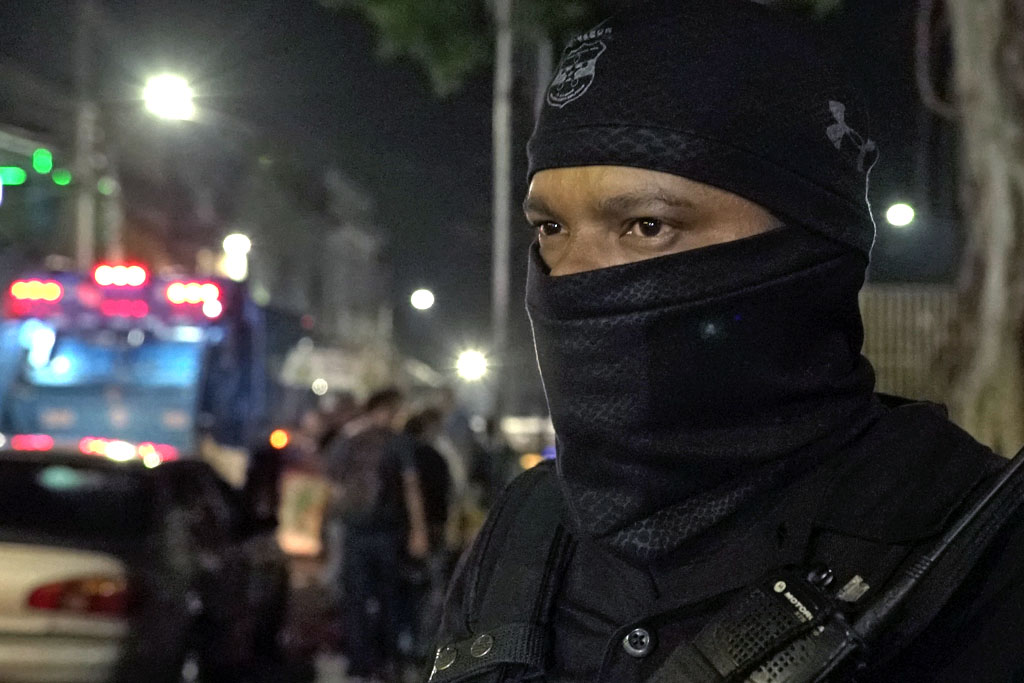
A member of the Jaguars on night patrol in San Salvador.
The UN’s special rapporteur for extrajudicial executions, Agnes Callamard, will highlight in her forthcoming report that 92% of investigations against Salvadoran police are dismissed in the first 72 hours, and very few result in conviction.
The report will say also that El Salvador’s attorney general announced in August last year that “his office had opened investigations into three death squads operating in the country: two in the eastern zone and one in the western zone, and in which police officers were involved.” It was unclear which groups the report was referring to.
In fact, there is only thought to have been one case of an officer being sentenced for an extrajudicial killing, on May 9 of this year. Critics say the units accused are simply dissolved, re-branded, and its officers redeployed to a new unit. Most of the Jaguar officers CNN spoke to admitted they were previously in the FES.
Hunted down
The FES were accused of the murder of two gang members, including one called Samuel Antonio Avelar Carpio -- whose gang name was “Eclipse” -- in a house in the District Italiano area near San Salvador in March 2017.
Witnesses described how FES officers stealthily moved through the neighborhood’s narrow streets before encircling one house where they located their target, Eclipse, in one of its bedrooms.
After Eclipse and his friends agreed to surrender to police, there was a long pause, followed by the four shots that killed them, one neighbor claimed.
The police screamed “Hand in your weapons!” and the men replied “there they are, mister,” the neighbor recalled. “And all of a sudden, we heard the first shot. Then there was some silence and, after, another four shots were fired.”
Eclipse’s mother, who sought anonymity like most locals in gang areas when discussing police activities, tearfully described how she believed her son had been killed.
“Here he was, lying down, his hands like this [behind his head], as he had been sleeping,” she said, motioning towards the bed where she claims he was shot in the back. “They killed my son.”
Salvadoran police investigated the killings, and no charges were filed. The police said in a statement that they were fighting “terrorists” who use murder as a currency, cited “awareness-raising and training processes on different issues regarding the respect of human rights and the use of force,” and said they were “purging from its ranks those who break legal norms.”
The police said 273 officers were accused of illegal armed aggression in 90 court cases last year, and said hundreds of officers were disciplined annually for various reasons.
"There’s a general belief about this unit having green light to kill these gang members, but that’s a lie,” the Jaguar commander Cesar Ortega told CNN. “We stick to the legal norms of our country. We can only respond against an aggression, we use the force level that apply to all police corps. And, as a last resort, we fire our weapons."
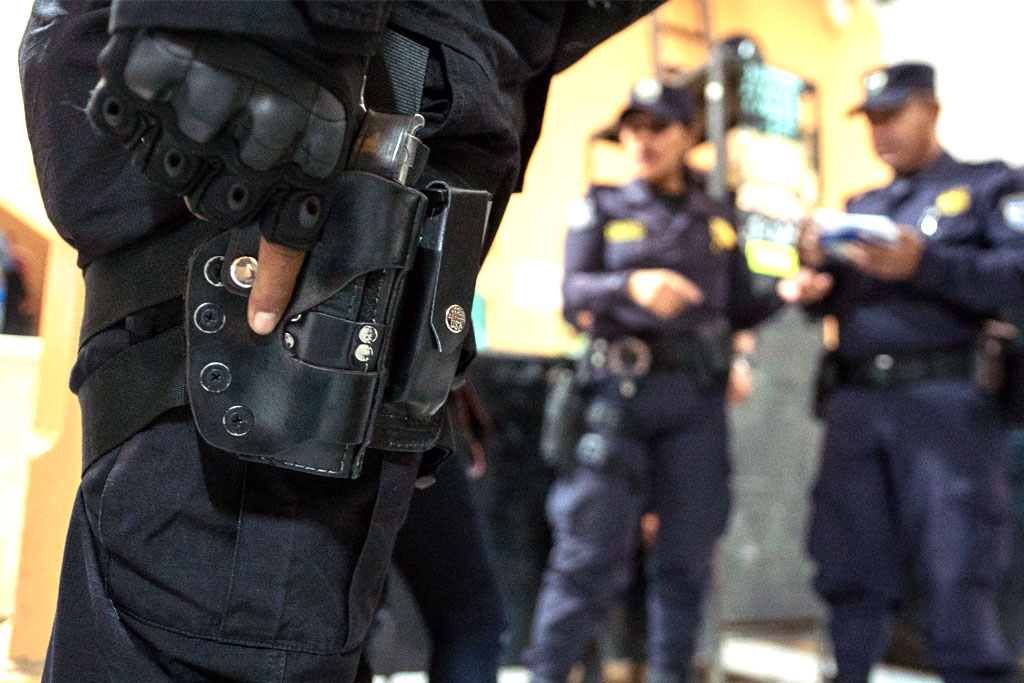
Beat officers from the National Civil Police on a routine patrol one night in April.
According to the upcoming UN report, 103 alleged gang members were killed in confrontations with police in 2014, yet the number rose to 591 in 2016.
In a rare interview, a senior MS-13 member said the recent spate of killings had caused the gang to think about “mediation” with the government.
Speaking anonymously, saying he feared police targeting, the spokesman told CNN: “We don’t have instructions to kill them, as they have with us. They picture the whole situation as an armed confrontation, but they place the weapons on the dead bodies themselves. What happened with Eclipse is not the only one.”
Despite MS-13 being accused of rape and murder, he went on to call for peace. “We’re ready to surrender the use of weapons at national level, but the government is not paying attention.”
“They are not tackling violence, they’re exterminating us, and the extra income is only used to pay police for killing us. So, we’re opening the door to mediators to help us.”
Such a plea for negotiation or a truce is not a new tactic, and critics will dispute whether the gang can sue for peace while roughly one tenth of Salvadoran society remains under their sway and at risk of their violence.
Previous deals have collapsed in the past, and analysts point out the renewed police crackdown is usually met with gangs escalating their violence in response.
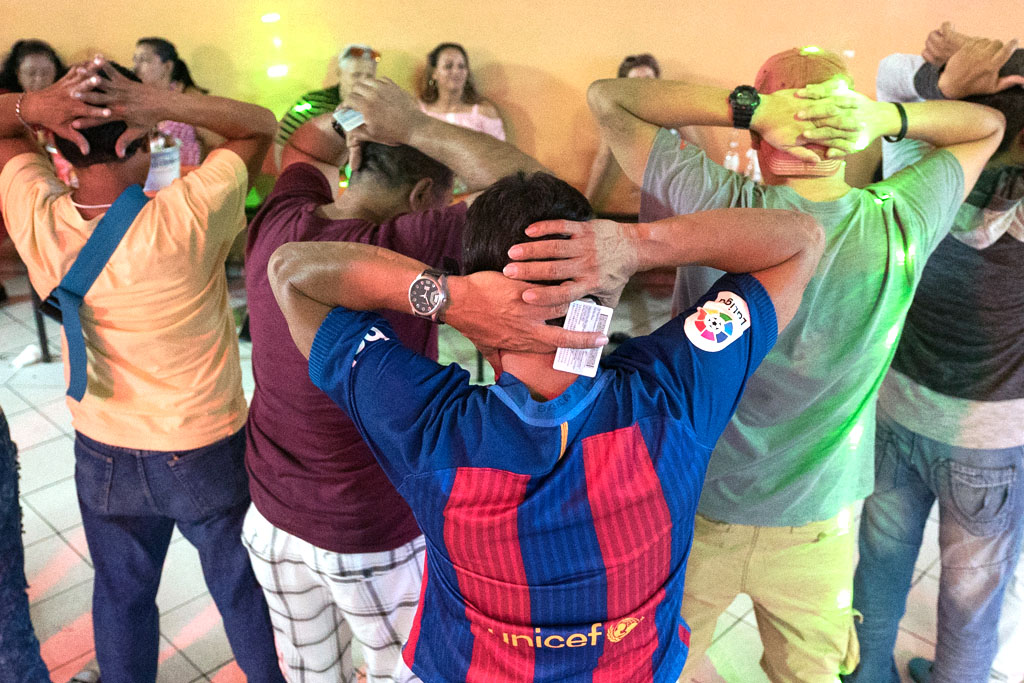
Locals have grown accustomed to routine police searches in the bars and discos of San Salvador.
El Salvador has recently changed its laws to soften the penalties for police conduct during its ongoing crackdown on gangs. Today, officers who are not charged within 72 hours of a killing can return to active duty -- a tweak in the law that critics say has resulted in the belief here that police can kill without consequence.
The killing is far from random, according to the WhatsApp messages between officers obtained by CNN.
In one conversation from May 2017, an FES officer urgently asks the informant for the photograph of a gang member named “Shadow” who he wants to “crash,” which in police jargon means “execute.”
The following conversation has been translated and lightly edited from a series of Spanish text and voice messages exchanged between police officers and an informant.
A risky investment
The ongoing multi-million dollar program of support for the Salvadoran police and military police presents a moral quandary for US policymakers. Providing assistance risks aiding and equipping units that may have been involved in haphazard and illegal executions, yet withdrawing aid altogether risks abandoning the Salvadoran police to a less effective future, one where they have no US support or oversight at all.
The Trump and Obama administrations have both recognized the acute nature of the MS-13 threat.
Until 2016, the program was overseen militarily by John Kelly, the former head of the Pentagon’s SOUTHCOM who is now Trump’s chief of staff.
While the US program is aimed at improving the effectiveness and legality of El Salvador’s fight against gangs, narcotraffickers and human smugglers, the “Firm Hand” strategy being deployed now by country’s government -- against a gang culture so widespread it amounts to an insurgency of sorts -- runs counter to lessons learned in Iraq and Afghanistan, according to some analysts. In those US-led conflicts, corrupt security forces and brutality exacerbated the ferocity of the insurgency.
Analysts have noted that brutal police tactics have previously backfired, as the gang members killed are sometimes looked upon more favorably in their neighborhoods, or less guilty than intelligence suggests, causing anger in the community and prompting some residents to turn away from the police and towards the gangs.
The US State Department mentioned the killing of Eclipse, the gang member, by FES officers in its 2018 report. “On August 25, the officers were released because the 72-hour holding period had expired,” the report noted. “They were put on Administrative leave but returned to active duty on September 12.”
In fact, it is possible one of those officers now works in the new Jaguar unit, according to expert analysis of his photograph and the footage of the new Jaguar unit filmed by CNN.
Asked to examine the images by CNN, Kenny Long, a former UK Metropolitan Police forensic identity expert, made a positive identification of the officer. Absolute certainty in identifications like this is rare, but Long said that the quality of the images were such that it would likely result in an arrest in a UK police investigation.
“It is rare to get images these clear -- the amount of features that are the same are very, very rare”, said Long. “If I made an ID like this [with the UK police], this person would be arrested.”
CNN is not naming the officer in question or showing his picture, as access to the Jaguar police unit was provided on the basis their officers would remain anonymous. Salvadoran police declined to comment on the officer in question, but did say the Jaguars go through an “internal selection process” so that “only qualified personnel can join the unit”.
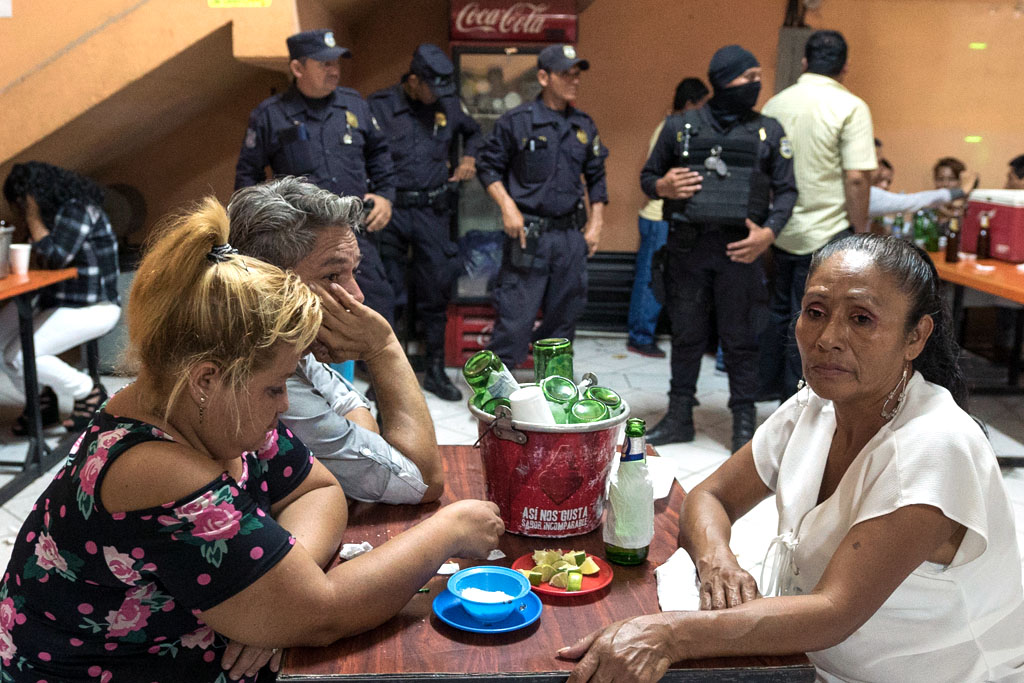
Visitors to a disco in San Salvador wait for police to finish their search in April.
Since the death of Eclipse, the people CNN spoke to in District Italiano say they have gone back to being ignored by the state again -- a place where poverty and unemployment are part of the daily grind of navigating gang culture and rule.
Leaning on a chain fence, one local woman said she hadn’t seen the police in the area since.
“Ever since that happened they don’t show their faces around here,” she said. “Maybe they don’t come back anymore because they have already done what they had to do.”
Following the publication of CNN’s investigation, the Director General of the National Police Howard Cotto said Thursday there were some inaccuracies in recent international media reports but did not provide further details.
Cotto emphasized that the police have the right under the constitution to use force to defend themselves and that if there are members within the 28,000-strong police force who carry out irregular acts they must be investigated.
CNN gave the authorities a week to provide a response ahead of publication, which was included in the report.
CNN's Christian Streib contributed to this report.
